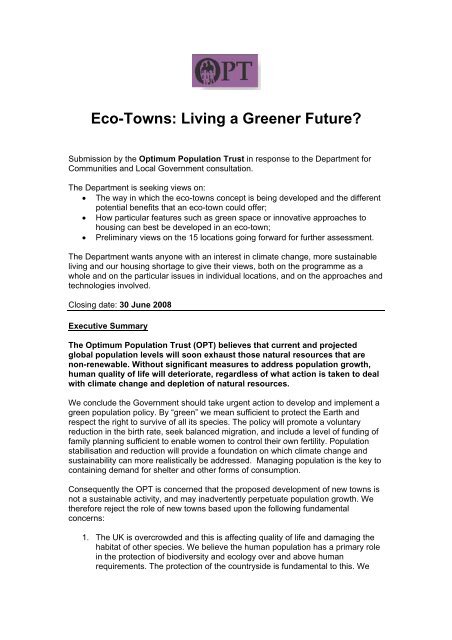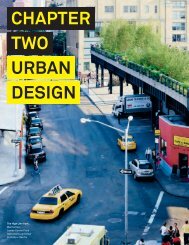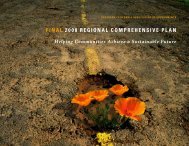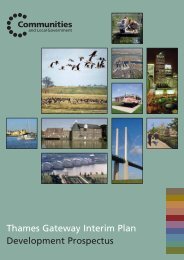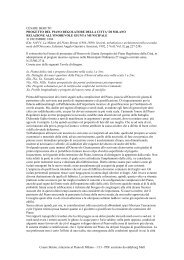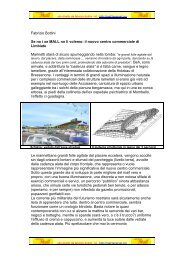Eco-Towns: Living a Greener Future? - Mall
Eco-Towns: Living a Greener Future? - Mall
Eco-Towns: Living a Greener Future? - Mall
You also want an ePaper? Increase the reach of your titles
YUMPU automatically turns print PDFs into web optimized ePapers that Google loves.
<strong>Eco</strong>-<strong>Towns</strong>: <strong>Living</strong> a <strong>Greener</strong> <strong>Future</strong>?<br />
Submission by the Optimum Population Trust in response to the Department for<br />
Communities and Local Government consultation.<br />
The Department is seeking views on:<br />
• The way in which the eco-towns concept is being developed and the different<br />
potential benefits that an eco-town could offer;<br />
• How particular features such as green space or innovative approaches to<br />
housing can best be developed in an eco-town;<br />
• Preliminary views on the 15 locations going forward for further assessment.<br />
The Department wants anyone with an interest in climate change, more sustainable<br />
living and our housing shortage to give their views, both on the programme as a<br />
whole and on the particular issues in individual locations, and on the approaches and<br />
technologies involved.<br />
Closing date: 30 June 2008<br />
Executive Summary<br />
The Optimum Population Trust (OPT) believes that current and projected<br />
global population levels will soon exhaust those natural resources that are<br />
non-renewable. Without significant measures to address population growth,<br />
human quality of life will deteriorate, regardless of what action is taken to deal<br />
with climate change and depletion of natural resources.<br />
We conclude the Government should take urgent action to develop and implement a<br />
green population policy. By “green” we mean sufficient to protect the Earth and<br />
respect the right to survive of all its species. The policy will promote a voluntary<br />
reduction in the birth rate, seek balanced migration, and include a level of funding of<br />
family planning sufficient to enable women to control their own fertility. Population<br />
stabilisation and reduction will provide a foundation on which climate change and<br />
sustainability can more realistically be addressed. Managing population is the key to<br />
containing demand for shelter and other forms of consumption.<br />
Consequently the OPT is concerned that the proposed development of new towns is<br />
not a sustainable activity, and may inadvertently perpetuate population growth. We<br />
therefore reject the role of new towns based upon the following fundamental<br />
concerns:<br />
1. The UK is overcrowded and this is affecting quality of life and damaging the<br />
habitat of other species. We believe the human population has a primary role<br />
in the protection of biodiversity and ecology over and above human<br />
requirements. The protection of the countryside is fundamental to this. We
elieve new build in rural locations should not take priority over the<br />
improvement of existing settlements.<br />
2. Focus on improvements to the sustainability of existing settlements is urgent<br />
if we are to meet our climate change objectives. Existing settlements<br />
comprise significant older building stock, upgrade of which is essential but<br />
remains largely unaddressed.<br />
3. New towns will not seriously address population and climate change issues -<br />
certainly not within the timescale that their urgency demands. The proposed<br />
developments will not achieve sufficiently high standards for housing; industry<br />
and commerce are likely to face even less stringent requirements.<br />
4. Impacts on biodiversity, landscape, water stress and flood risk will be serious.<br />
5. New settlements will exacerbate demand for land, food, water and energy.<br />
Rural land will increasingly be required for food production if population levels<br />
are not reduced.<br />
6. New towns are likely to generate significant extra traffic congestion and<br />
pollution.<br />
We believe that new towns would not be required were the Government to put in<br />
place the appropriate green population, energy and sustainability policies. New towns<br />
are designed to promote economic growth; hence the competitive process to<br />
determine specific sites. This is contrary to the principles of restraint required to<br />
control and reduce population, address climate change and promote sustainability.<br />
In fact OPT believes that new towns will achieve the very opposite of what is claimed.<br />
We do not distinguish new towns from the concept of eco-towns in that higher<br />
environmental standards should be anticipated for all new development in the light of<br />
climate change and recent Government statements of intent.<br />
Current rising demand for housing should be achieved through redevelopment and/<br />
or extension of existing settlements, which will be less environmentally damaging and<br />
less energy intensive.<br />
Introduction and Context<br />
The Optimum Population Trust is the leading think tank in the UK concerned with the<br />
impact of population growth on the environment and aspires to “advance<br />
environmental protection by promoting policies in the United Kingdom …, which will<br />
lead or contribute to the achievement of stable human population levels which allow<br />
environmental sustainability”.<br />
Beliefs<br />
The OPT defines an optimum population as a population size which is:<br />
1. Environmentally sustainable in the long term.<br />
2. Affords people a good quality of life.<br />
3. Has adequate renewable and non-renewable resources necessary for its<br />
long-term survival.<br />
4. Consumes or recycles them to ensure it will not compromise the long-term<br />
survival of its progeny.<br />
5. Ensures adequate allowance for biodiversity throughout the UK.
Aims<br />
The OPT campaigns for stabilisation and gradual decrease of population globally and<br />
in the UK. For the UK, our aims are that the population should be encouraged to<br />
stabilise and decrease by not less than 0.25% a year to an environmentally<br />
sustainable level. This will be achieved by bringing immigration into numerical<br />
balance with emigration, making greater efforts to reduce teenage pregnancies, and<br />
by encouraging couples to "Stop at Two" children.<br />
Why the OPT is responding to this consultation<br />
1. The OPT is concerned that the requirement for additional housing is partly<br />
due to the growing UK population.<br />
2. Sustainability concerns consumption patterns relative to available resources.<br />
The root cause is growth/ change in population.<br />
Failure to reduce population in the near future may lead to a population crash when<br />
fossil fuels, fresh water and other resources become insufficient to maintain existing<br />
or future population levels. Urban development has a direct impact on resource<br />
depletion (including land), and carbon emissions, and is likely to exacerbate them.<br />
Predicted growth in demand for housing results from a failure to address the serious<br />
issue of population growth. Given all these factors, we believe new towns are neither<br />
necessary nor desirable.<br />
The DCLG consultation document 1 outlines three challenges designed to be met by<br />
eco-towns:<br />
1. Climate change<br />
2. The need for more sustainable living<br />
3. The need to increase housing supply<br />
One of the benefits envisaged from eco-towns is the innovation that competition will<br />
bring to the built-environment market place. Best practice has been examined by the<br />
Town and Country Planning Association (TCPA) but is yet to be fully elaborated 2 .<br />
The Government should make clearer the standards to which eco-towns are to<br />
aspire.<br />
Our responses to the challenges are detailed below, dealing with the key driver<br />
behind eco-towns (housing supply) first:<br />
Minimising demand for housing<br />
Housing demand is a function of factors such as birth rate, longevity, excess of<br />
immigration over emigration and household formation rates. All are increasing and<br />
are significant factors in the demand for housing. However, population growth, itself<br />
driven mainly by immigration, is by far the biggest factor in the predicted increase in<br />
demand for housing, accounting for at least 59 per cent, according to the Office for<br />
National Statistics. Changing age distribution accounts for 20 per cent while the trend<br />
towards smaller households accounts for only 17 per cent.<br />
1 CLG <strong>Eco</strong>-towns consultation document, pg.8 - 9<br />
2 CLG <strong>Eco</strong>-towns consultation document, pg.10
The ONS forecasts that the UK population will rise by 24 million to 85 million by<br />
2081 3 - an increase of nearly 40 per cent. By itself, this is a massively unsustainable<br />
figure, which will have devastating implications for the UK environment and quality of<br />
life. At the same time, however, average household size is just over 2 persons and<br />
declining.<br />
The consequences are alarming. At projected household formation rates, a<br />
population of 85 million would require over 40 million homes - 15 million more than<br />
the current total of some 25 million. Since there are something over three million<br />
houses and flats in London, the UK will be faced in housing terms with building nearly<br />
five more Londons to cope with current population projections.<br />
On the basis of the Government’s current figures, the eco-towns programme will<br />
provide a maximum of fewer than 100,000 houses, and possibly, depending on which<br />
of the short-listed developments go ahead, many fewer. Set against the projected<br />
need for another 15 million, this is an insignificant – indeed, almost derisory – figure.<br />
In that sense the eco-towns programme is at best an irrelevance, at worst a<br />
distraction from the real task in hand - securing sustainable population levels. (It<br />
amounts to about less than one per cent - actually 0.65 per cent - of long-term<br />
housing need.)<br />
We therefore urge the Government to minimise future demand by developing and<br />
implementing a clear “green” strategy for determining and achieving a sustainable<br />
level of population for the UK. England is by some measures the world’s fourth most<br />
densely populated country (behind Bangladesh, South Korea and the Netherlands -<br />
figures exclude smaller island and city states). Without a population strategy,<br />
Government faces a long and hopeless rearguard action - reacting to the social and<br />
environmental problems resulting from uncontrolled population growth rather than<br />
managing for a sustainable future.<br />
We believe the following must be addressed within the development of population<br />
policy:<br />
Birth rate<br />
The UK birth rate has been increasing in recent years. Around 40 per cent of<br />
pregnancies are unplanned 4 . The OPT welcomes Government initiatives to<br />
encourage improved access to emergency and long-term contraception, but believes<br />
that further measures are necessary. We recommend that all couples are<br />
encouraged to stop at two children. The benefits system should be reviewed with the<br />
aim of removing “perverse” subsidies to have babies while safeguarding families and<br />
children from poverty. Tax incentives that encourage women to have large families<br />
should be resisted.<br />
Teenage pregnancy<br />
The rate of teenage conception in the UK is the highest in the EU. Notwithstanding<br />
current Government programmes, there is still much to do in terms of sex and<br />
relationships education, provision of family planning and improving the life chances of<br />
disadvantaged teenagers. More detailed proposals can be found on our website at<br />
http://www.optimumpopulation.org/opt.more.famplan.uk.html<br />
3 ONS 2006-based projections<br />
4<br />
Evriwoman poll 2004
Migration<br />
OPT notes the recent House of Lords committee report that immigration has brought<br />
no overall benefit to the UK 5 . We welcome recent Government measures to restrict<br />
immigration. However, migration monitoring is weak 6 . Additionally, there is no control<br />
over intra-EU migration, and no target for net migration has been set. OPT urges the<br />
Government to improve monitoring, work with other EU Governments to further limit<br />
immigration to the EU, and set a target of zero net migration for the UK.<br />
The case against eco-towns<br />
Given that green policies on population and sustainability will significantly reduce<br />
demand for housing, the logic of new towns becomes even more questionable. We<br />
urge consideration of the following issues:<br />
Green space and biodiversity<br />
OPT believes the promotion of eco-towns as good for biodiversity is misguided and<br />
misleading. Examples of good practice in small-scale development which have<br />
protected and enhanced biodiversity are unlikely to be repeated on an urban scale.<br />
New towns will diminish biodiversity 7 through their construction, through the<br />
requirement for additional roads, power lines, water supplies, sewerage,<br />
telecommunications, and through the excursions and activities of residents and users<br />
of the towns. These effects include increased flood risk and water, noise and light<br />
pollution, which are increasingly being shown to disrupt wildlife. In an age of growing<br />
ecological insecurity, land is a precious resource. New towns will use land likely to be<br />
needed in future for food and energy production. The proposal to include significant<br />
green space within the eco-towns, while understandable, will have the effect of<br />
reducing density and increasing the land take.<br />
Housing density<br />
It is difficult to extract data about housing density from the consultation document<br />
because of the disparate ways in which the figures have been provided for each of<br />
the proposed locations. None of the proposals indicate how much space will be<br />
required for public facilities such as schools, health centres, shopping centres, sports<br />
etc. Nevertheless, given the need to protect diminishing land resources and previous<br />
Government directives to increase residential density, it is fallacious for the<br />
consultation document to take a garden city such as Letchworth as an example of<br />
how a new town can combine “the health of the country with the comforts of the<br />
town” 8 because this was designed at the beginning of the last century, at a time when<br />
the population of England was still within sustainable levels, without the concerns for<br />
housing density, land usage and zero carbon emissions that apply today.<br />
Community building<br />
OPT believes that the development of eco-towns will require a greater development<br />
of new community structures compared to adaptation and extension within or<br />
adjoining existing settlements.<br />
5<br />
House of Lords <strong>Eco</strong>nomic Affairs Committee <strong>Eco</strong>nomic Impact of Immigration statement, April 2008<br />
6<br />
Commons Treasury Committee Counting the Population HC183, May 2008<br />
7 Natural England State of the Natural Environment 2008<br />
8 <strong>Eco</strong>-towns Prospectus 2008
Jobs<br />
OPT is concerned at the lack of detail on employment within the consultation<br />
document. There are references to harnessing “the employment potential of local<br />
areas” and “enabling links to existing clusters of employment within the sub-region”.<br />
These suggestions will involve travel to and from the new settlement.<br />
We are, therefore, concerned that eco-towns will effectively be dormitory towns,<br />
generating new large-scale movements of people to and from their places of work.<br />
This will lead to extra car use and the need for upgrading of road infrastructure in the<br />
surrounding areas, with a significant impact on biodiversity, as has been<br />
demonstrated in the case of previous new town developments.<br />
Travel<br />
OPT welcomes aspirations for transport planning and a shift away from car-based<br />
transport, but considers them to be unrealistic for the proposed eco-town locations.<br />
As already stated, increased travel and energy use will be generated. The majority of<br />
people moving to the new locations to live will work outside the settlement, while<br />
many of the jobs created in the settlements will be taken by people who choose not<br />
to live there. The proposed size of the eco-towns suggests that they will not have<br />
sufficient infrastructure in terms of public services, shopping, entertainment and the<br />
like to prevent substantial amounts of travel to other settlements.<br />
The Government already faces challenges in converting car use to public transport<br />
use in existing settlements with established public transport infrastructure and<br />
sufficient population density to warrant major investment. <strong>Eco</strong>-towns will not be likely<br />
to have rail as part of the public transport plan. Even taking into account the “anti-car”<br />
proposals outlined in the consultation document, private bus operators are unlikely<br />
to achieve the scale required in the relatively small eco-town settlements that will<br />
produce the sort of public transport service level necessary to change personal<br />
behaviour.<br />
Reacting to climate change<br />
Housing and related urban infrastructure are among the main sources of energy<br />
consumption. Energy focused design, energy efficiency and conservation measures<br />
can significantly reduce energy use. The first priority is always to conserve and then<br />
to produce only what is truly required in as sustainable a manner as possible. One<br />
way this might be achieved is the zero carbon energy policy proposed by the Centre<br />
for Alternative Technology 9 . A constituent part of a zero carbon energy plan must be<br />
to target major reductions in energy use.<br />
We are concerned that the development of green energy within eco-towns is a<br />
bottom-up approach that will take years to come to fruition, and longer to influence<br />
policy and behaviour within the country as a whole. It will not come to fruition on a<br />
national scale within the 20-year timeline within which many activists believe climate<br />
change must be addressed 10 . Therefore, climate change and pressure on resources<br />
must be confronted within society as a whole if serious consequences are to be<br />
prevented.<br />
9 http://www.zerocarbonbritain.com/<br />
10 http://www.zerocarbonbritain.com/
<strong>Future</strong> climate change<br />
Making communities more resilient to the effects of climate change is necessary.<br />
However, it is important to ensure that the causes of climate change are tackled and<br />
that efforts are not limited to adaptation. The construction of new settlements on<br />
previously undeveloped land exacerbates climate change. OPT urges the<br />
Government to recognise that population growth in this country and throughout the<br />
world serves only to multiply the impacts of climate change. Climate change cannot<br />
be addressed effectively without stabilising and ultimately decreasing population<br />
levels, nationally and globally.<br />
Alternatives to new towns<br />
Where new build property is proposed, opportunities within or adjoining existing<br />
settlements should be explored. This will minimise land take and enable existing<br />
infrastructure and services to be utilised. It is notable that the overseas examples<br />
included in the consultation document are all extensions/ redevelopments within<br />
existing cities: Vauban, a district of Freiburg; Hammarby, a formerly brownfield area<br />
within Stockholm: and Scharnhauser Park, Ostfildern, within the urban perimeter of<br />
Stuttgart. These may be good examples of eco-development, but are not new<br />
settlements on the eco-town model.<br />
The primary focus should therefore be on improving existing settlements. Where<br />
there remain opportunities for infill through building on under-used ground within<br />
existing settlements, and redeveloping space-inefficient sites, these should be taken.<br />
Government, nationally and locally, should ensure the more efficient use of existing<br />
urban and peri-urban land while retaining allotments, public green space, urban<br />
wildlife habitats and “green infrastructure” within existing settlements. As part of this<br />
approach, efforts to bring vacant and under-used properties and buildings into the<br />
housing need equation must be intensified: one example is upper floor space above<br />
shops and offices.<br />
Refurbishment<br />
Sustainability standards in current building are being improved 11 ; however, we<br />
believe the Government should enforce much stricter sustainability standards on the<br />
building industry through a subsidised programme of retro-refurbishment of existing<br />
property, designed to improve energy efficiency dramatically. Refurbishment will<br />
engage property owners to action on a mass scale and address the huge volume of<br />
existing property that forms the bulk of housing stock.<br />
We support abolishing VAT for building repair and refurbishment to encourage<br />
property improvement and extension and to give renovation and new build equal<br />
treatment.<br />
Public services<br />
Development of existing urban and rural settlements and thereby the extension or<br />
improvement of existing community facilities is likely to be lower cost both financially<br />
and environmentally than building new facilities in eco-towns. It will benefit existing<br />
communities and provide the opportunity for retro-fitting of sustainability measures.<br />
11<br />
CABE Environmental Sustainability and the Built Environment
Travel<br />
Significant car use and increased fossil-fuel consumption are likely to result from the<br />
development of new towns - ironically, at a time when the world faces the challenge<br />
of peak oil 12 . Development in or adjoining existing settlements is a better way of<br />
reducing travel volume, enabling access to existing and broader public transport<br />
networks. The travel aspirations outlined in the consultation document are best<br />
addressed within existing settlements where they are most urgently needed.<br />
Water<br />
Housing and associated urban infrastructure are major users of finite water<br />
resources. Housing location also has a bearing on vulnerability to flood risk and the<br />
severity of flooding that might result. As a drier climate leads to increasing scarcity of<br />
water, competition for supplies will affect urban and rural areas alike. Water is the<br />
subject of major supply and consumer waste, and these should be tackled with more<br />
urgency by Government.<br />
In relation to housing the OPT would expect Government to adopt a more<br />
prescriptive approach to water conservation. The standards and timelines proposed<br />
for housing stock in relation to the Code for Sustainable Homes do not require the<br />
maximum standard to be achieved quickly enough. If the maximum (Level 5/6)<br />
standard is not achieved at the outset on development that occurs before 2016, it is<br />
not likely to be achieved in the longer term. For non-household buildings, no<br />
standards have been specified.<br />
Waste<br />
The OPT would like to see design focus on minimal building materials resource use<br />
beyond that required for maximum energy efficiency. We would also urge that use of<br />
reclaimed and recycled materials be encouraged over and above the responsible<br />
sourcing requirements detailed within the Code for Sustainable Homes.<br />
We would like to see the adoption of measures to reduce lifestyle and business<br />
consumption. In particular, these should be designed to prevent waste from<br />
consumer and industrial packaging. Providers/ retailers of products and services<br />
should be obliged to adopt less profligate practices. Consumers of waste should also<br />
be incentivised to reduce waste through imposition of charges. Opportunities to<br />
explore composting where re-use for energy production is not possible should be<br />
considered. Waste generated in eco-towns unless composted or used for energy<br />
production is not likely to be disposed of locally, and will be shipped out of the area at<br />
a consequent environmental cost.<br />
Improvements to the built environment<br />
OPT believes that improved sustainability of all housing is essential if environmental<br />
targets are to be met. Some 21 of 25 million homes in 2003 were built before 1980 13<br />
and most will still be in use in 2050 14 . We believe that Government should do more to<br />
improve the sustainability of existing housing. This would benefit both occupied<br />
property and under-utilised property (for example, the 672,000 homes that are<br />
empty 15 ) which could be brought into use.<br />
12 http://www.powerswitch.org.uk/<br />
13<br />
Helweg-Larsen, T. and Bull, J., 2007<br />
14<br />
Boardman, B et al., 2005<br />
15 Empty Homes Agency, 2007
OPT also believes that action to reduce fossil fuel consumption and speed up<br />
substitution by green forms of energy is urgently needed. This is not sufficiently<br />
served by experimentation at the “micro-level” of new towns. The necessity to reduce<br />
carbon emissions by at least 60 per cent by 2050 16 is extremely challenging. It will<br />
require much more radical action than that so far announced. Therefore, green<br />
population, energy and sustainability policies which can be implemented at a national<br />
level are urgently required.<br />
We believe that the proposed standards for new homes and other buildings within<br />
eco-towns are not rigorous enough, do not maximise potential within existing<br />
standards where they exist (Code for Sustainable Homes level 5/6), and, in setting<br />
level 3 as a minimum, carry the consequence that zero carbon status will not be<br />
achieved.<br />
While building new homes to ambitious environmental standards might provide<br />
lessons for sustainability gains to existing housing stock, this is not sufficient reason<br />
for building new towns. There are already good examples within this country and<br />
Europe of sustainable homes, so the case for further experimentation through the<br />
building of new towns is weak.<br />
In conclusion, we believe the rationale for eco-towns is based on a discredited<br />
“predict and provide” approach which is a wholly inappropriate way of dealing<br />
with major environmental challenges. Population growth is incontrovertibly<br />
the biggest factor behind rising housing demand and we believe the evidence<br />
is clear that there would be substantial public support for the sort of national<br />
population strategy we have outlined. Such a strategy might well make the<br />
whole idea of eco-towns redundant.<br />
Optimum Population Trust<br />
Tel: 07976-370221 www.optimumpopulation.org info@optimumpopulation.org<br />
Registered charity No: 1114109 Company limited by guarantee No: 3019081<br />
Patrons: Prof. Sir Partha Dasgupta, Prof. Paul Ehrlich (USA), Dr. Jane Goodall DBE, Prof. John<br />
Guillebaud, Susan Hampshire OBE, Prof. Aubrey Manning OBE, Prof. Norman Myers CMG,<br />
Sara Parkin OBE, Jonathon Porritt CBE, Sir Crispin Tickell GCMC KCVO<br />
Submission produced by Andrew Gill, Simon Ross and Richard Wilson with support from OPT<br />
members, June 2008<br />
16 Boardman, B et al., 2005


